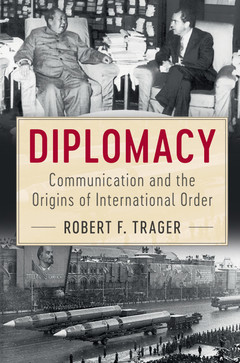Diplomacy Communication and the Origins of International Order
Langue : Anglais
Auteur : Trager Robert F.

This book explores questions such as: How do adversaries communicate? How do diplomatic encounters shape international orders and determine whether states go to war?
How do adversaries communicate? How do diplomatic encounters shape international orders and determine whether states go to war? Diplomacy, from alliance politics to nuclear brinkmanship, almost always operates through a few forms of signaling: choosing the scope of demands on another state, risking a breach in relations, encouraging a protégé, staking one's reputation, or making a diplomatic approach all convey specific sorts of information. Through rich history and analyses of diplomatic network data from the Confidential Print of the British Empire, Trager demonstrates the lasting effects that diplomatic encounters have on international affairs. The Concert of Europe, the perceptions of existential threat that formed before the World Wars, the reduction in Cold War tensions known as détente, and the institutional structure of the current world order were all products of inferences about intentions drawn from the statements of individuals represented as the will of states. Diplomacy explains how closed-door conversations create stable orders and violent wars.
1. Can adversaries communicate?; 2. How perceptions of intentions form; Part I. Theory: 3. The scope of demands; 4. Risking a breach; 5. Balancing allies and adversaries; 6. Diplomatic approaches; Part II. Empirical Analysis: 7. The fruit of 1912 diplomacy; 8. How Germany weighed British resolve in 1938–9; 9. Statistical analysis of diplomatic communication; 10. Creating international orders; Appendices: A. Proofs for chapters 3-6; B. Inference data set; C. Threats, offers, and assurance dataset; D. German inferences prior to World War II.
Robert F. Trager is Associate Professor of Political Science at the University of California, Los Angeles. He has also taught at Yale University, Connecticut and the University of Oxford, held an Olin Fellowship at Harvard University, Massachusetts, and worked in investment banking in New York. His published work has appeared in such journals as the American Political Science Review, the American Journal of Political Science, the Journal of Politics, International Organization, International Security, and Security Studies.
Date de parution : 10-2017
Ouvrage de 300 p.
15.8x23.5 cm
Disponible chez l'éditeur (délai d'approvisionnement : 14 jours).
Prix indicatif 85,25 €
Ajouter au panierDate de parution : 10-2017
Ouvrage de 318 p.
15.2x22.6 cm
Thème de Diplomacy :
© 2024 LAVOISIER S.A.S.



